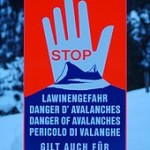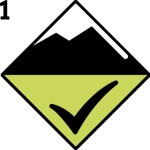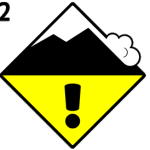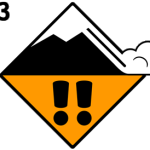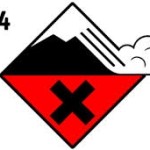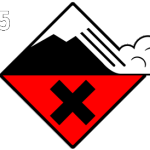Austrian Natural Disasters – Avalanches
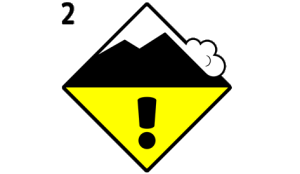
Growing up in small town PA, I received ample instructions on how to “stop, drop and roll” in case of a fire and chariots-of-fire myself to the basement in case of a tornado. Fortunately, life never put me in a position where I had to click my red shiny heels to there’s-no-place-like-home myself back to Pittsburgh. However, on a few occasions, I actually did have to brace for a hurricane in NC, but found myself hard-pressed to locate a cellar and woefully uncertain whether the little closet under the stairs, the bathtub or the kitchen table would offer the best shelter.
In Austria, there are other disasters to worry about. No tornadoes or hurricanes but an occasional earthquake will hit. When that happens, it’s the talk of the town but usually centered someplace in Italy and so subtle that people who can claim they felt “something” are countered with skeptical nods. “No, really, I felt it. Something swayed at 4 am. It did! It really, really did!”
But there is one natural danger that all Austrian Elizabeths and Josefs have been schooled in from the day they could slip their little toesies into a snow boot and its not one I knew anything about prior to moving to Alpine country – avalanches.
Let’s face it, living in Vienna, I am relatively safe from avalanches since the biggest hill in the city is probably the one at the Gloriette which I will hike up for a coffee and an Apfelstrudel without ever risking the perils of an unfrozen snow mantle burying me on the way. Avalanche dangers here come from “Dachlawinen” (Roof Avalanches) of melting snow and ice crashing on the pavement during the thaw period after a winter storm and perhaps an occasional whirlpool cover flying off a rooftop apartment during a “Sturm” when high winds blow through the city.
Still, if you want to visit or live in Vienna, you will eventually be dragged out into the mountain air with these mountain loving people (see last week’s post on Fahrvergnügen) and that’s not necessarily a negative but you do want to do so sensibly. That explains why, for me, the image at the beginning of the post, seems more like a festive little yield sign with a Santa cap pulled down over the eyes rather than a warning “Danger! Avalanches Possible”
There were a lot of avalanches this past weekend in the Alps and 10 people didn’t make it out. A few weeks back, two young prospects from the US ski team tragically lost their lives far too young in an avalanche while training in Sölden, Austria.
I too spend time in the mountains in winter and though I am a miserable skier, don’t snow board or go on “Skitouren,” I’ve hiked in the mountains in winter and knew absolutely NOTHING about avalanches. So I thought many of you out there might not as well, and I put together a little something to help us all out and to let you know that yield signs here don’t don Santa hats to get in the season – those signs are there for a reason and should be understood. Don’t avoid the Alps in winter – they’re beautiful – but definitely enjoy them safely!

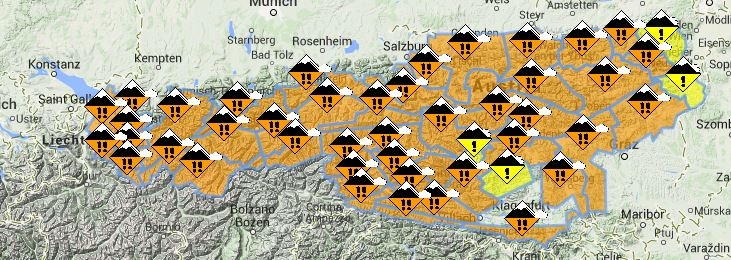
Avalanche Map from http://www.lawine.at/ – which regularly updates a map on their website with the avalanche situation in Austria
- 1 (low)
An avalanche is only possible with a great amount of additional burden on very few, extremely steep slopes. Sudden avalanches (so-called slides) are not to be expected. Generally safe conditions. (This seems to be a thumbs up for your outing).
- 2 (moderate)
An avalanche is probable with great additional burden particularly on marked steep slopes. Larger avalanches are not expected. The snow mantle is generally well solidified except on some steep slopes. Use caution when choosing routes with marked steep slopes and slope exposure. (This is a thumbs up for an outing without Barney or the members of ABC’s Extreme Makeover: Weight Loss cast members at the beginning of the season).
-
3 (substantial)
An avalanche is already probable with just a small amount of additional burden particularly on steep slopes. From case to case sudden, several middle, single but also large avalanches are possible. (I think this means that if you’re unlucky, and pick the wrong slope, you could be in for it). The snow mantle is only slightly or moderately solidified on many steep slopes. Experience in judging avalanches required. When possible avoid steep slopes and slope exposure.
- 4 (great)
An avalanche is already probable with just a small amount of additional burden particularly on steep slopes. From case to case sudden, several middle, single but also large avalanches are possible. (Again, you’re kind rolling dice here) The snow mantle is only slightly solidified on many steep slopes.When choosing a route, stay restricted to moderately steep slopes as well as careful of avalanche run out areas. A lot of experience in judging avalanches required. (Who has “avalanche judging experience – Judge Judy on skis?)
- 5 (very great)
Many sudden large avalanches, also in moderately steep slope areas are to be expected. At this risk level, no safe operation of ski areas is possible. (This might mean that you’re considered safe hanging out in the Skihütte). The snow mantle is generally weak and unstable. Refraining from tours is recommended. (I would say, this is the Austrian polite way of saying: Don’t Do it!)
Definitions
Moderately steep: up to a 30° slope angle
Steep slopes: more than a 30° slope angle
Small additional burden: for example a single skier, snowboarder or snow shoe walker or mean with an e-book but not necessarily my carry on luggage.
Significant additional burden: for example a group of skiers without safety distance between them, a snow groomer, or an avalanche blasting crew – or maybe me WITH my carry on luggage.
Avalanche report recording is available free of charge throughout Austria under the number 0800 501 588, also a newsletter and App is also available free of charge under: (http://www.snowsafe.eu/).
Lawinen Quiz in German:
The New York Times Report on US skiers Ronnie Berlack and Bryce Astle: http://www.nytimes.com/2015/01/06/sports/two-us-ski-team-prospects-die-in-avalanche-in-austria.html
